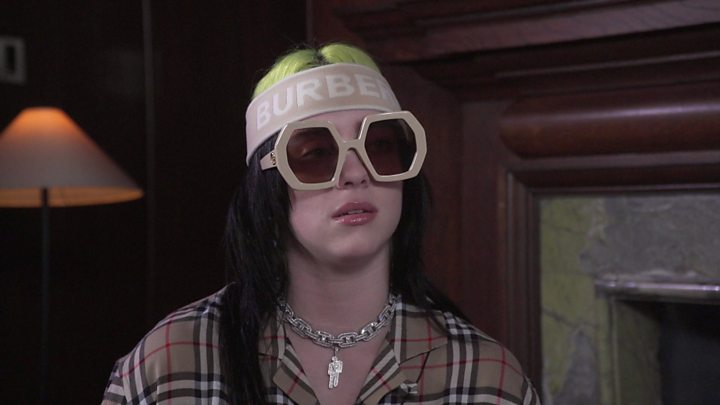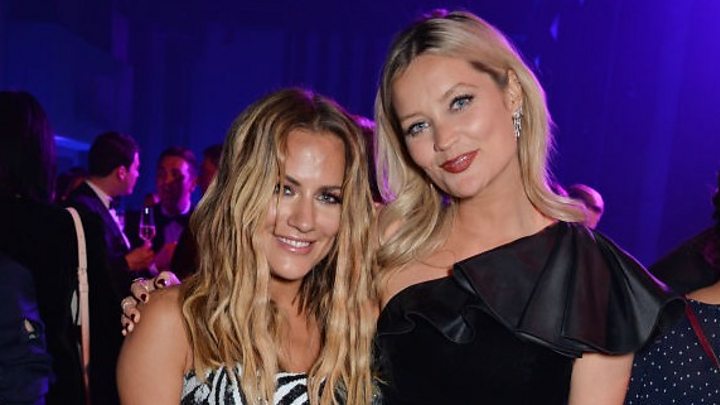Former Love Island presenter Caroline Flack's death prompted not just an outpouring of grief, but an overwhelming demand for it to become a turning point for the treatment of celebrities on social media and the press.
The night after hosting her first live edition of The X Factor in 2015, Caroline Flack was not on a high after reaching another peak in her career. She was in tears after looking at social media.
"The reaction was quite overwhelming because I didn't think people would be talking about how I look, how I stand, how I walk or how I laugh," she said at the time.
"Not everyone is going to like you all the time, not everyone is going to think you're beautiful, but there is a difference between opinion and abuse."
Those are words that many celebrities - especially women - will relate to.

Media playback is unsupported on your device
Speaking to BBC Breakfast on Tuesday, Billie Eilish - fresh from winning five Grammys, recording the new James Bond theme and having the best-selling album of 2019 - revealed she had recently stopped looking at comments.
"It was ruining my life," she said. "It's weird, the cooler the things you get to do are, the more people hate you. It's crazy. It's way worse than it's ever been right now."
Her brother and producing and songwriting partner Finneas O'Connell added: "You might see someone who's a 'famous celebrity' and you might think sticks and stones, nothing I can say is going to actually be potent to them. But it all is. It's all very equal online."
Little Mix singer Jesy Nelson, Brit Award winner Dua Lipa and former Girls Aloud star and The Masked Singer champion Nicola Roberts are a few others who have spoken about the impact of trolling.
'Social media is a witch hunt'
"There has to be a line," Roberts told BBC News on Monday. "There is a culture of a slight witch hunt that happens and social media certainly can prove to be toxic at times.
"I think it would be great if we could eliminate those elements within society."
Social media has come under scrutiny in the search for explanations and blame since Flack's suicide on Saturday at the age of 40 - as have the mainstream media, and the Crown Prosecution Service (CPS) for pressing ahead with a trial after she was charged with assaulting her boyfriend.
At her last hearing, on 23 December, where she pleaded not guilty, the TV presenter seemed to be struggling with the media attention and courtroom pressure.
The following day - Christmas Eve - she wrote on Instagram that "this kind of scrutiny and speculation is a lot to take on for one person to take on their own".
No-one will really know what Flack was thinking, and the reasons for any suicide are usually numerous and complex.
As well as the attention, Flack had lost her job on Love Island, having stood down after being charged; been banned from contacting her boyfriend by the court; and was facing trial for domestic abuse.
The loudest refrain after her death was for people to "be kind", especially on social media.
Laura Whitmore, who replaced Flack on Love Island, appealed to listeners on her BBC Radio 5 Live show "be kind" to others, and added: "To paparazzi and tabloids looking for a cheap sell, to trolls hiding behind a keyboard - enough."
Whitmore added: "I'm not going to pretend she was perfect, but is anyone? She lived every mistake publicly, under the scrutiny of the media."

Media playback is unsupported on your device
Comedian Russell Brand echoed her cry on his blog: "I am angry because I have watched this play out before with vulnerable people in the public eye and I would like to slay with some righteous sword the salacious, foaming, incessant poking, trolling judgment that chased her to the grave," he wrote.
A petition calling for "Caroline's Law", which would make it an offence for the media to "knowingly and relentlessly bully a person", has reached 700,000 signatures at the time of writing.
Brand said he admired "the optimism" of the petition. "But the media is made up of people, the world of celebrity is made up of people, social media is made up of people. All culture, all values pass through the consciousness of individuals and collectives," he wrote.
"If we want the world to change, for less people to die in pain and shame then we should pause before we next vent a pleasurable stab of vindictive judgment or jeering condemnation."
'Really frightening'
Asked how long the spirit of kindness might last, columnist and author Joan Smith, who chairs the Mayor of London's Violence Against Women and Girls Board, replied: "It lasts for about 10 minutes usually, doesn't it?"
Women like Flack attract a different kind of media attention than men, Smith told BBC Radio 4's Woman's Hour, noting that the presenter's legal case had put her under an intense spotlight.
"That kind of attention for somebody who is fragile is really frightening," she said. "I think part of the problem is most people see this on a case-by-case basis. 'That's really awful. Something ought to happen.' And then it all dies down again."
She added: "But we did actually have an inquiry, The Leveson Inquiry, which I myself gave evidence to, and whatever happened to that?"
The 2011 and 2012 inquiry investigated the conduct of the press after the phone-hacking scandal, but the second part of the inquiry was scrapped by the government, and a new system of self-regulation was set up.
"I remember saying at the time, it's not independent, it's too much influenced by newspaper editors. And I still think that's the case," Smith said.
'We are feeding the monster'
Labour MP Jo Stevens, who sits on the House of Commons Culture, Media and Sport select committee, said the second part of the Leveson Inquiry "would have looked at precisely the role of newspapers in reporting on this sort of activity".
Her committee will "want to look at" what was said about Flack on social media and in the press, she told BBC Radio 5 Live. "And we also need to look at ourselves and how we behave.
"Because these stories that are written online, every time someone clicks on a story to read about it, salacious gossip stories about celebrities and personalities, we are feeding that monster because it is creating revenue for the websites."
But former Sunday Mirror editor Paul Connew said most of the coverage of Flack's case had been based on facts in the public domain, or information she had put on social media.
"She's lived her life on the social media platform and in a way, once that's in the public domain, you can't blame the mainstream media for focusing on it," he said.
"But the mainstream media haven't adopted the sort of approach that's taken place on social media, on the Wild West of cyberspace, where people can be as abusive and cruel and wildly inaccurate as they like because they are hiding in nearly all cases behind anonymity."
PM: Social media firms 'must go further'
There have been calls for tighter regulation of social media in the wake of the star's death, with suggestions for measures like removing that anonymity by forcing anyone who signs up to provide ID and a photo.
That would go further than proposals contained in a proposed new law to counter "online harms", under which regulator Ofcom will "set out steps that should be taken to tackle cyberbullying".
Responding to Flack's death on Monday, a spokesman for Prime Minister Boris Johnson said: "The industry must continue their efforts to go further. We expect them to have robust processes in place for removing content breaching their acceptable use policies."
Last year a think tank, the Center for Countering Digital Hate, published a report suggesting celebrities should respond to trolls by ignoring and blocking them.
- More powers for Ofcom to police social media firms
- Are other countries tougher on social media firms?
On Monday, broadcaster and former Big Brother contestant Andy West said: "When we're talking about practical solutions, if you're finding social media difficult and it's getting you down - and Lord knows it gets me down almost every day - try and control yourself and make sure you're not adding to that by getting involved in the nastiness, and take your own personal responsibility.
"But I absolutely agree that we've reached a point now where, to earn your voice on social media, you have to prove you are who you say you are, and you have to be willing to stand by your words.
"I would go further and say you have to have a photograph that you can have verified."
Monica Shafaq, chief executive of health and wellbeing charity The Kaleidoscope Plus Group, added: "Delete their accounts. Make people verified, for example, before they can actually start using Twitter.
"There has to be some control in place because people are losing their lives as a result. It's not a joke.
"Caroline's not the first person to be a victim of this, and sadly she won't be the last until we make some significant changes."
Follow us on Facebook or on Twitter @BBCNewsEnts. If you have a story suggestion email entertainment.news@bbc.co.uk.
Entertainment - Latest - Google News
February 18, 2020 at 09:41PM
https://ift.tt/2SVKjLJ
Caroline Flack death: Will people now 'be kind' in the media and online? - BBC News
Entertainment - Latest - Google News
https://ift.tt/2AM12Zq
Bagikan Berita Ini














0 Response to "Caroline Flack death: Will people now 'be kind' in the media and online? - BBC News"
Post a Comment